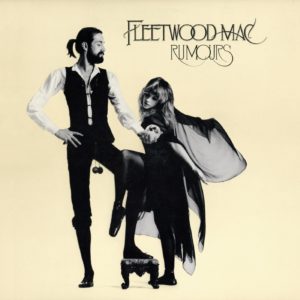Marketplace
2009 Warner Brothers PRESSING
- RPM 45
- Audio Stereo
- Catalog Number 517781-1
- Release Year 2009
- Vinyl Mastering Engineer Kevin Gray
- Pressing Weight 180g
- Vinyl Color No
- Jacket Style Gatefold
- 100% Analog Mastering Yes
- Original Release Year 1977
- Speed 45 RPM
Buckets of ink have been spilled to analyzing and interpreting Fleetwood Mac’s eleventh studio album—and deservedly so. Rumours remains the fifth best-selling record of all time because, in addition to its hook-filled melodies and road-tested musicianship, the music resonates with nearly anyone whose love affairs didn’t end with a happy sunset. It also serves as a quintessential example of how performers can masterfully transform pain into entertaining art.
Imagine, for instance, how difficult it was for bassist John McVie to play on a dozen takes of the perky hit “You Make Loving Fun,” a torch song that witnesses his ex-wife (keyboardist Christine McVie) singing about her then-new lover who also happened to be the group’s lighting manager. Recording sessions were further complicated by Lindsey Buckingham and Stevie Nicks’ disintegrating relationship, a drama that fueled the lyrics of “Go Your Own Way.” Interpersonal trauma permeates nearly every track on Rumours—as does the residue from prodigious amounts of cocaine and alcohol that informed the album’s grueling, year-plus-long recording and post-production process.
While the band’s turmoil inspired stunning creativity, the chemicals and chaos proved a challenge for the project’s technicians, engineers Ken Caillat and Richard Dashut. Both had to contend with tapes that had nearly been ruined by repeated production playback. According to Caillat, the damage resulted in Mick Fleetwood’s snare and kick-drum tracks sounding “lifeless.” And while a vari-speed oscillator was used to salvage the tapes, Caillat’s recollection goes a long way to explaining why original pressings of Rumours don’t stand up to the sonic standards of the band’s 1975 self-titled album.
Which leads us to the all-analog remaster of Rumours by engineers Kevin Gray and Steve Hoffman. Pressed on graveyard-quiet 45RPM vinyl at Germany’s Pallas plant, it’s nothing short of miraculous. Fleetwood and McVie’s previously muted drum and bass rumble now sounds like a window-rattling, door-busting, three-dimensional assault. The intricate interplay on Nicks, McVie, and Buckingham’s layered vocal tracks possess a delicacy and realistic nuance obscured on all prior pressings, including the slightly noisier 33RPM version of this very remaster. The 45RPM edition brings us closer to the music’s pulse and demands undivided attention. Yes, the tip-on gatefold cover slightly deviates from the original, but the raised, glossy texture of Herbert Worthington’s iconic photo of Fleetwood and Nicks proves a nice touch. When it comes to the analog magic all vinyl fans crave, there’s no finer example of Rumours. It is the gold standard.
Rumours


 4.5
4.5